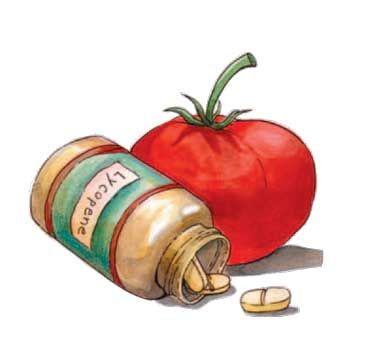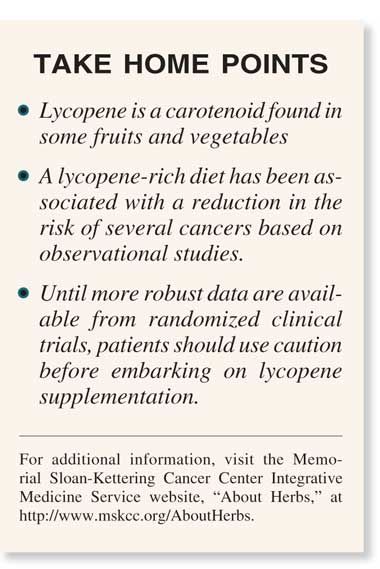Lycopene
Lycopene is a carotenoid found in tomatoes, grapefruit, watermelons, and papaya. It is also synthesized by plants and microorganisms, but cannot be synthesized by the human body and can only be obtained via diet. Lycopene as a dietary supplement is a potent antioxidant used to help prevent cancer, heart disease, and macular degeneration. It is classified as a nonprovitamin A carotenoid because it cannot be converted to vitamin A.
Lycopene is a carotenoid found in grapefruit, watermelons, and papaya in addition to tomatoes. It is obtained only through diet. Lycopene exhibits antioxidant and anticancer properties.
Results from several epidemiologic studies suggest a strong association between high intake of lycopene-rich foods and reduced risk of several cancers, notably prostate cancer. However, few well designed clinical trials have been conducted, and data remain inconclusive.
Because lycopene supplementation is associated with strong antioxidant effects, it has the potential to interfere with chemotherapy and radiation therapy. Cancer patients should use caution if considering an increase in their lycopene intake.
-Barrie Cassileth, PhD
ALSO KNOWN AS: Nonprovitamin A carotenoid

SUMMARY: Lycopene is a carotenoid found in tomatoes, grapefruit, watermelons, and papaya. It is also synthesized by plants and microorganisms, but cannot be synthesized by the human body and can only be obtained via diet. Lycopene as a dietary supplement is a potent antioxidant used to help prevent cancer, heart disease, and macular degeneration. It is classified as a nonprovitamin A carotenoid because it cannot be converted to vitamin A.
A few studies have suggested benefits of lycopene for exercise-induced asthma[1] and benign prostatic hyperplasia.[2] Data from epidemiologic studies indicate an inverse relationship between dietary and supplemental lycopene consumption and risk of cancers, particularly prostate,[3] lung, and stomach cancers, as well as estrogen receptor (ER)- and progesterone receptor (PR)-positive breast cancers.[4] Furthermore, low intake of tomato sauce was associated with advanced prostate cancer in patients with low-grade cancer at diagnosis.[5] A few randomized clinical trials have been conducted to determine the role of lycopene in prostate cancer with mixed results.[6] Well designed studies are warranted.

Proposed mechanisms of action in cancer prevention include inhibition of cancer growth, induction of differentiation by modulation of cell-cycle regulatory proteins, alterations in insulin-like growth factor–1 or vascular endothelial growth factor levels, prevention of oxidative DNA damage, and possible enhancement of carcinogen-metabolizing enzymes.[7]
ADVERSE REACTIONS: No adverse effects have been reported at normal doses of lycopene. Chronic ingestion of large quantities of lycopene-rich foods, such as tomato products, can cause lycopenodermia, characterized by deep orange discoloration of the skin.[8] A possible interaction between lycopene and alcohol consumption was reported, indicating that cytochrome P450 (CYP) 2E1 expression is induced by high doses of lycopene and alcohol.[9]
References:
REFERENCES
1. Neuman I, Nahum H, Ben-Amotz A: Reduction of exercise-induced asthma oxidative stress by lycopene, a natural antioxidant. Allergy 55:1184-1189, 2000.
2. Schwarz S, Obermuller-Jevic UC, Hellmis E, et al: Lycopene inhibits disease progression in patients with benign prostate hyperplasia. J Nutr 138:49-53, 2008.
3. Etminan M, Takkouche B, Caamano-Isorna F: The role of tomato products and lycopene in the prevention of prostate cancer: A meta-analysis of observational studies. Cancer Epidemiol Biomarkers Prev 13:340-345, 2004.
4. Giovannucci E: A review of epidemiologic studies of tomatoes, lycopene, and prostate cancer. Exp Biol Med (Maywood) 227:852-859, 2002.
5. Giovannucci E, Liu Y, Platz EA, et al: Risk factors for prostate cancer incidence and progression in the health professionals follow-up study. Int J Cancer 121:1571-1578, 2007.
6. Van Patten CL, de Boer JG, Tomlinson Guns ES: Diet and dietary supplement intervention trials for the prevention of prostate cancer recurrence: A review of the randomized controlled trial evidence. J Urol 180:2314-2321; discussion 2721-2712, 2008.
7. Seren S, Lieberman R, Bayraktar UD, et al: Lycopene in cancer prevention and treatment. Am J Ther 15:66-81, 2008.
8. Institute of Medicine, Food and Nutrition Board. Beta-carotene and other carotenoids. Dietary reference intakes for vitamin C, vitamin E, selenium, and carotenoids, pp 325-400. Washington, DC; National Academy Press; 2000.
9. Veeramachaneni S, Ausman LM, Choi SW, et al: High dose lycopene supplementation increases hepatic cytochrome P4502E1 protein and inflammation in alcohol-fed rats. J Nutr 138:1329-1335, 2008.
For additional information, visit the Memorial Sloan-Kettering Cancer Center Integrative Medicine Service website, “About Herbs,” at http://www.mskcc.org/AboutHerbs.
Late Hepatic Recurrence From Granulosa Cell Tumor: A Case Report
Granulosa cell tumors exhibit late recurrence and rare hepatic metastasis, emphasizing the need for lifelong surveillance in affected patients.